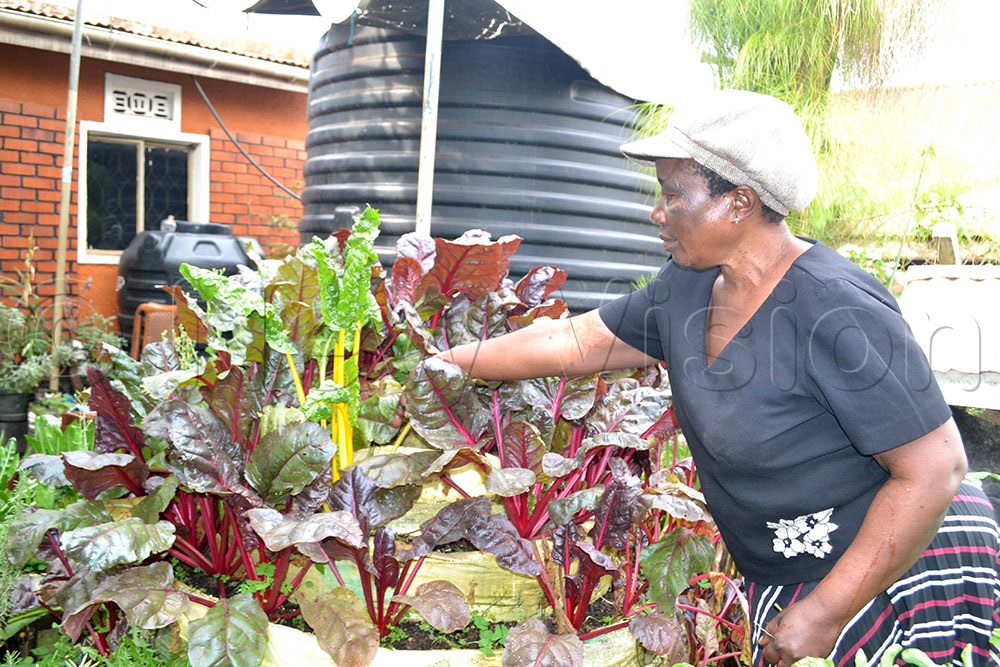While growing up, Harriet Nakabaale had a dream of becoming one of the most outstanding farmers in Uganda.
However, due to lack of enough land, she opted to use tins on her verandah, planting different vegetable species like onions, tomatoes, strawberries and many others.
“I grew up with the idea to carry out farming, even before getting my own land, I would buy onions for sh500 and then plant like three in a tin in my verandah until I got money and bought my own plot of land. I believed that if I plant my crops on the landlord’s veranda and he does not complain, it would give me the morale to grow and expand,” Nakabaale says.
In 1992 Nakabaale acquired her own 50×30 piece of land where she built her house and used the backyard to put up a garden.
She started her backyard farm in 1994 while specialising in vegetables like beetroot, spinach, kale (sukuma wiki), rosemary, onions, tomatoes, lemon verbena, lemon balm, strawberry, dodo, grapes, guavas and lettuce.

She later reared livestock, ducks, chicken and fish. In the process, she realised that animal droppings can serve as manure for the crops.
“I do not use artificial methods of farming like fertilisers; instead, I use organic manure that I generate from my livestock farm. This has worked for me,” she says.
She adds that her mother, who makes use of her own compound to plant different crops is her main inspiration.
“I grew up looking at my mother planning her compound and planting numerous crops and I derived all the knowledge from her,” Nakabaale says.
Starting up
Nakabaale says when she started farming, she went all the way, using her compound fully to grow plants. She only left a small space that visitors and those who want to learn about backyard gardening could use. “I started with small quantities and I kept growing,” she said.
Subsequently, her diligence paid off. Nakabaale says she collected empty tins and containers from wherever she could find and used them as planters.
“I used everything that could take a crop in it. The most collected items in my garden are boots, basins, bottles and sacks in which I grow crops,” she says.

Benefits
In the beginning Nakabaale used her backyard garden to grow her own food. However, as she grew more and more vegetables, she started selling some, and was able to pay school fees for her children.
She also acquired three big tanks that have helped her store water for irrigation. This helped her save on water bills from National Water that were quite expensive.
Nakabaale has also been able to meet many people who she has trained. She has enlarged her backyard garden of vegetables to include livestock and spices.
Challenges
Just like any other business, Nakabaale says she faced a couple of challenges while starting up.
“At first my crops used to be destroyed by animals from the neighbourhood, but after winning the Woman Achiever’s award by the New Vision, it came with money that helped me to fence my land and it gave me courage to enlarge my dream. I started a seed bank, from which I use to keep the gardening running without having to spend on seed, but instead sell to people starting gardening and make extra money,” she says.
Nakabaale is now faced with a challenge of space because her dream grows bigger day by day.
Advice
Nakabaale says commitment and a love for gardening are key in establishing and keeping such a garden.
“Do not start big because you might get overwhelmed. It is better to start small and keep growing,” she says. She adds that one should not let losses deter them from keeping the dream alive, but should use them as a lesson to improve and become better at backyard gardening.
“Perseverance is key,” she says.
For those with demanding jobs and businesses who feel divided between keeping their jobs and carrying out backyard gardening, it is possible to draw a timetable such that they apportion time for office work and backyard gardening.
“Backyard gardening will help one get additional income to substitute on their salary at the end of month,” she says.
Maintenance
Just like a baby is given milk and food to grow, Nakabaaale says a backyard garden needs manure and fertilisers if one is to get a bumper harvest. She says watering her garden very early in the morning when the sun rises and in the dusk when the sun sets has also increased her yields.
What experts say
Moses Kinene, a landscaper, gardener and compound expert says backyard farmers should learn how to use organic manure in their gardens as chemicals come with different problems.
“Maintaining a backyard garden is challenging, but I advise backyard gardeners to use organic manure as opposed to chemicals. Some of the people selling these chemicals on the market lack enough expertise in the field. As such, if a farmer has no idea about the fertilisers, they might get challenges,” Kinene says.





